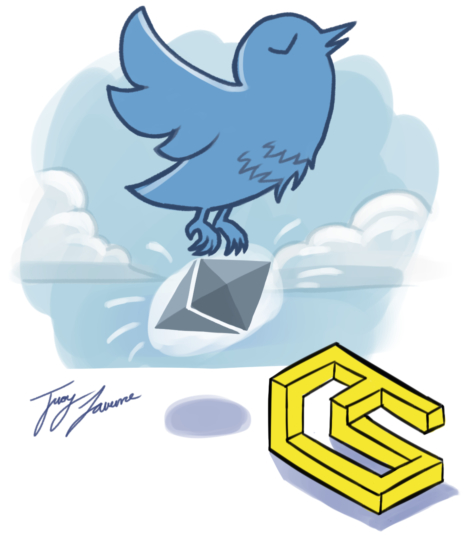Right before Christmas last year, then U of T math and statistics student Mikerah Quintyne-Collins received over $100,000 USD in cryptocurrency from Ethereum creator Vitalik Buterin and promptly dropped out of U of T.
In a Twitter thread between cryptocurrency developers in December, Quintyne-Collins tweeted to Buterin, “I will quite literally drop out if we got $100k in ETH.” She asked and she received.
I will quite literally drop out if we got $100k in ETH.
— Mikerah (@badcryptobitch) 19 December 2018
After dropping out, Quintyne-Collins, a programmer, researcher, and blockchain enthusiast, switched to working full-time at ChainSafe, a Toronto-based startup that works on blockchain applications, such as automatically enforced smart contracts. Blockchain is a decentralized method of securely storing data that relies on cryptography, the math behind encoding and decoding messages securely.
Ethereum is the second-largest cryptocurrency by market capital, next to Bitcoin. At the time of the transaction, the 1,000 Ether that Buterin sent Quintyne-Collins had a value of $100,630 USD. Now, that same amount is worth around $174,000 USD.
Buterin is a university dropout himself, having left the University of Waterloo in 2014 to work on Ethereum full-time after receiving $100,000 USD through the Thiel Fellowship, a grant awarded annually to people aged 22 and under to drop out of school and pursue full-time work.

These days, Quintyne-Collins is pretty busy with her job, working to develop a platform that may eventually be a part of a new version of Ethereum.
“The main thing that I miss about university [is] Goldring,” she said.
While her mother had wanted her to return to her studies, Quintyne-Collins does not see the need. “People haven’t asked me about my degree. In fact, every time I tell somebody I dropped out to work on Ethereum, they just say, ‘Congrats.’”
“I know myself well enough to know that this is better for me, rather than taking courses I’m not interested in,” she told BreakerMag.
When I asked about her ambitions and plans, Quintyne-Collins said that she was going to “go with the flow.”
Even before university, much of her efforts had been focused outside of school. She taught herself how to code when she was 13 by borrowing library books. Bitcoin then piqued her interest around 2011 when she was in high school and it first made the news; this prompted her to start reading research papers on cryptography.
She became more involved in blockchain during her second year, when Buterin came to U of T for a talk on crypto-economics. This also brought her in touch with ChainSafe, where she would eventually start working part-time as a project lead while continuing her studies.
Before dropping out, Quintyne-Collins was also President of the U of T Blockchain Group and had co-organized a number of blockchain hackathons. Even after dropping out, she helped host this year’s ETHUofT hackathon alongside the group’s current president. This is where I met Quintyne-Collins, as I was volunteering with registration on a Friday evening in the Bahen Centre for Information Technology.
She believes that universities are more useful for forming connections than learning. She added that a number of top universities have materials and resources available online for free.
“This last semester, I wasn’t doing… any schoolwork, to be honest. I might have failed some courses,” she told me.
That being said, she would not encourage just anybody to drop out and find work. “If you have nothing else going for you, then your GPA is pretty much all you have.”
Quintyne-Collins was admitted to the first-year computer science stream when she started at U of T but chose not to pursue the program of study. “I wasn’t going to pay the extra tuition… If you can get a degree for 8k a year versus 15k a year and end up with the same job, who’s the idiot? The person who paid more for it.”
She has also co-authored a study published in the STEM Fellowship Journal and is currently conducting research with a fellow U of T dropout working in blockchain. They are not sure about which journals to publish in yet, but it will at least be on arXiv, an open-access digital repository of research papers.
“For computer science, it doesn’t really matter that much,” she said, referring to the publication they will ultimately choose.
When asked how to get involved in the blockchain scene and get one’s foot in the door, Quintyne-Collins said, “Contribute to open source projects and attend events if you’re technical. And if you’re non-technical, you should organize the events.”
She emphasized the need for talent in the scene beyond just computer science, but also in communication and outreach. “If you’re good at building communities and bringing people together, that’s just as important as being able to write code.”


